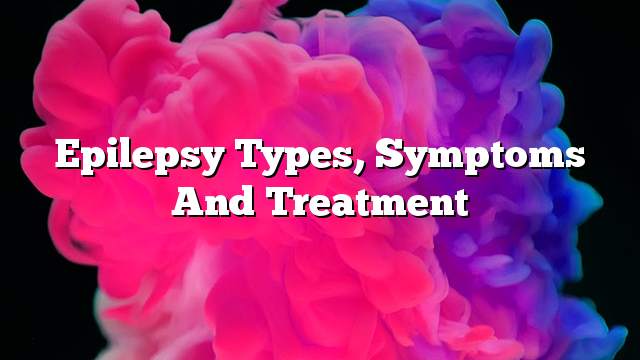Epilepsy
Is an imbalance in the electrical signals in the brain produces frequent neurological episodes and the patient is usually unconscious of not feel what is happening to him and the subsequent cramps and contractions caused by the electric wave on the brain and also in many cases the cause is unknown.
Types of epilepsy
- Large epilepsy: It is the occurrence of full cramps and tremors of all the muscles of the body where the patient is completely unconscious.
- Small epilepsy usually occurs in children where the patient loses consciousness for a short period and then returns to consciousness.
Causes of epilepsy
- Insomnia, fatigue and stress.
- Hyperthermia .
- Smoking and drinking alcohol.
- An earlier history with disorders and neurological disorders.
- Infection, malnutrition and lack of oxygen.
- Congenital birth defects in brain neurons.
- A stroke or falling directly on the brain.
- DNA .
- Cancer of the brain.
Symptoms of epilepsy
Symptoms of general seizure
- Loss of consciousness and fall.
- General muscle stiffness.
- Spasmodic convulsions and convulsions.
- Frequent salivary secretions.
- Coma and muscle relaxation may occur with urination or stool exit.
- There is often vomiting.
- Confusion when awake.
- The victim does not retain any memory of the Nubia.
- The duration of the seizure is 3 or 4 minutes but sometimes it can wait for 20 minutes before returning to the original state.
Simple partial Nubia symptoms
- The patient maintains contact with reality.
- He suffers from various problems (difficulty speaking properly, convulsions and trembling of organs, distortion of voice and visual).
- Problems in the senses (smell and taste different).
- Stomach problems.
- Sense of mine and fear.
- Nubia period from seconds to three minutes.
Complex Nubia Complex Symptoms
- Loss of contact with reality.
- The victim does not retain any memory of the Nubia.
- Nubia period from seconds to three minutes.
Complications of epilepsy
- The occurrence of disturbances of pregnant women may be impaired fetal defect of birth.
- Vibrating patient personality and social relations.
Treatment and prevention of epilepsy
Drug therapy and antispasmodic drugs
- Provide all safety methods for patients with epilepsy such as:
- We put him on flat ground and tend his head and neck so as not to choke.
- The removal of anything that may cause him harm from furniture and sharp materials.
- Protect the patient’s head by placing a pillow or a soft tooth under his head.
- Remove everything that stifles the patient or pressure him, whether clothes or others.
- Provide privacy and stay calm with the patient until he wakes up and does not put anything in the patient’s mouth and treat the case of swallowing the tongue if it occurs.
Surgical treatment
If the patient does not improve with medication, the last option is to perform the surgical procedure, and to have full control of epileptic seizures that affect the brain.
Diagnosis of epilepsy
The causes of epilepsy are not known, but there are tests performed by the doctor for epilepsy patients. These tests include the device for the planning of brain power (IEG) where the doctor notes that there were abnormal disorders in the brain.
The dangers of epilepsy
- Obstruction of the respiratory tract, due to sliding tongue base or choking of secretions especially secretions of the mouth.
- Head injury caused by the loss of consciousness.
- It is possible that a person is infected with an acute or hot substance and poses a high risk of injury or burns.
- It is possible that a person may become unconscious while driving the vehicle, which poses a risk of road accidents.
